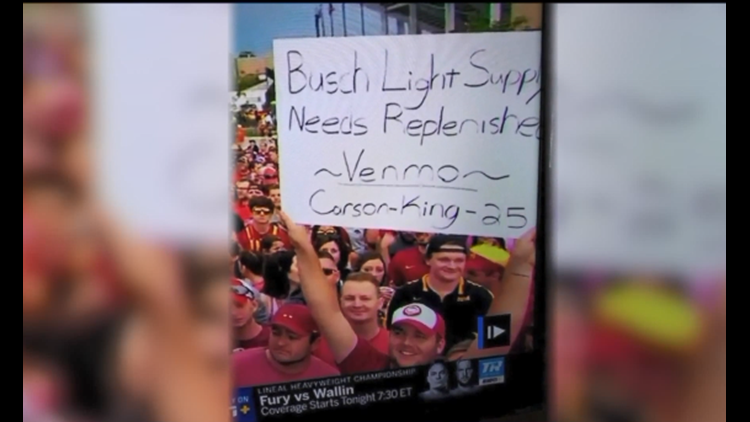More than a month after losing his job in the wake of a viral feel-good story that turned into controversy, a former Des Moines Register reporter is sharing his side of what happened.
In a first-person editorial published in the Columbia Journalism Review, Aaron Calvin – known for his viral profile on Iowa fan and Busch Light drinker Carson King – shared his side of what unfolded in the days before he lost his job at the Iowa newspaper.
In his article, Calvin said he worked as a viral news reporter for seven months before being assigned to the Carson King piece. The profile looked into the life of the man gaining national attention for his stunt asking for beer money that turned into a multi-million dollar charity project.
Where this story turned controversial was toward the bottom of the Des Moines Register profile, where a couple of old tweets found on King’s Twitter account were mentioned. The tweets were described as “joke tweets” that contained insensitive content. When reminded of the tweets, King apologized and deleted them.
In his editorial, Calvin said looking back into King’s social media was part of a background check he was asked to run and was “standard practice at the Register.”
“I told my editor about the tweets and was asked to reach out to King for comment,” wrote Calvin. “I believe this was the right thing to do. Performing background checks on public figures is part of a journalist’s responsibility.”
That interaction prompted King to publicly apologize for the tweets, before the Register profile was published. Calvin said King “moved to get ahead of the details that would be revealed in the profile.”
“When I asked King about his tweets, I tried to communicate that I was not trying to bring him harm,” Calvin wrote. “It’s clear to me now, though, that he was worried about personal blowback.”
Shortly after the profile was published, Calvin said people on Twitter found some offensive tweets he had posted in the past. His workplace requested that he tweet an apology for the tweets.
Calvin said the days between King’s public apology and when he was fired “were some of the worst” of his life. He described endless death threats and angry messages coming from all angles.
Ultimately, Calvin said he was faced with two options from Gannett, quit or be fired.
“I chose to be fired,” he wrote.
In his editorial, Calvin said he fears the decision made by Gannett was fueled by public demand. He said he felt as though the character he’d established as employee was not taken into consideration.
Looking at the bigger picture, Calvin said his company may not have been “prepared for what virality truly meant.”
According to data and technology group ShareProgress, the definition of “viral” is when any person who comes across the content shares it with at least one other person.
The Carson King story trended for several weeks as new layers unfolded. And even more than seven weeks after the initial reports about King’s generosity started coming out, a “Carson King” search on Google garners about 26,100 results.
But even Calvin noted that his piece of the story is starting to fall off. He noted that less than a week after he separated from the Register, the paper wrote another story about King’s fundraising efforts, and there was no mention of Calvin to be found.
“Nearly as quickly as the Carson King story made me into a villain, it is leaving me behind,” wrote Calvin.



